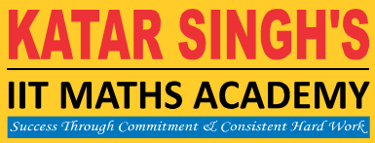

Top 10 Mistakes Students Make in JEE Maths – And How to Avoid Them
Preparing for IIT-JEE Maths is a challenging yet rewarding journey. However, many students unknowingly fall into traps that hamper their progress, despite putting in long hours. At Katar Singh IIT Maths Academy, Sector 17, Faridabad, we’ve mentored thousands of JEE aspirants, and through this experience, we’ve identified ten common mistakes students make — along with practical ways to avoid them. One of the biggest mistakes students make is skipping NCERT books thinking they are too basic. But NCERT forms the core of conceptual understanding, especially in chapters like Coordinate Geometry, Limits, and Continuity. Students should build a solid foundation before jumping to advanced material. Another common issue is focusing only on tough problems, which leads to unnecessary frustration. Instead, students should follow a gradual approach—first mastering easy and moderate questions to develop confidence and accuracy. Many aspirants tend to neglect topics they find difficult, such as Trigonometry, Probability, or 3D Geometry. This weakens their overall performance. Breaking these topics into manageable parts and practicing regularly with expert help can make a big difference. A lack of regular revision is another critical error. It’s not enough to study a chapter once—concepts must be revised consistently through weekly plans and a dedicated formula notebook. Similarly, over-relying on coaching without consistent self-practice often leads to poor retention. Remember, coaching provides direction, but self-study builds discipline and mastery. One more mistake is not solving previous years’ JEE papers. These papers offer insight into question patterns and difficulty levels. Solving at least 10 years’ worth of papers can dramatically improve your preparation. Poor time management during mock tests and the actual exam also hurts scores. Students often get stuck on one problem and lose precious time. Practicing full-length tests under timed conditions helps improve decision-making under pressure. Some students make the mistake of postponing doubt resolution, which creates knowledge gaps. Doubts should be addressed immediately through mentoring sessions or peer discussion. Another overlooked area is the lack of a personalized preparation strategy. Every student has a unique learning style, and copying someone else’s routine may not yield results. Design a plan that fits your strengths and targets your weaknesses. Finally, many students focus on attempting more questions rather than solving accurately. In JEE, accuracy is more important than attempts. Silly mistakes, especially in calculation, can be avoided by reading questions carefully and double-checking work. In conclusion, avoiding these common mistakes can significantly improve a student’s performance in IIT-JEE Maths. At Katar Singh IIT Maths Academy, we focus on building a student’s fundamentals, strategy, and confidence through small batch sizes, personalized doubt-clearing, and a proven curriculum designed by Katar Singh Sir, who has over 25 years of experience and has mentored more than 2000 students to IIT.
Katar Singh IIT Maths Academy
Excellence
Premier IIT Maths Coaching for Competitive Success.
Contact Us
SCF 124-125, Second Floor (Above Union Bank of India),HUDA Market ,Sector 17,Faridabad,Haryana,121002
# 9873848629 # 9891492962 # 9910792962
© 2025. All rights reserved.
Best math teacher in Faridabad
Best math teacher for JEE preparation in Faridabad
Best math teacher for Olympiads preparation in Faridabad
Best math teacher for boards preparation in Faridabad
Best math tuition in Faridabad
Best math teacher in sector 17 Faridabad
